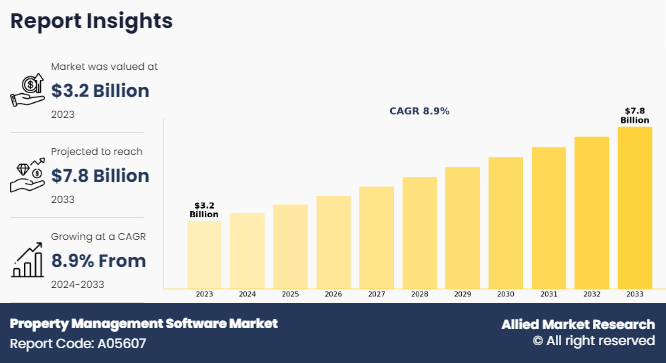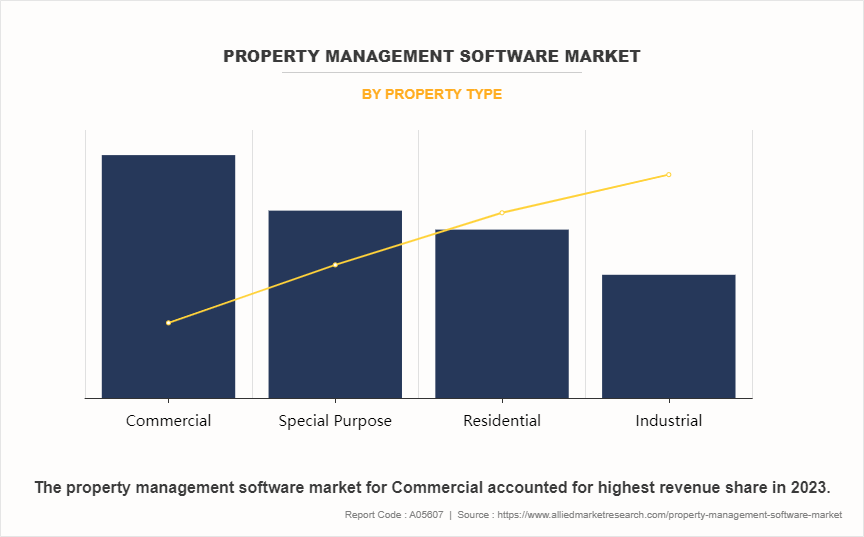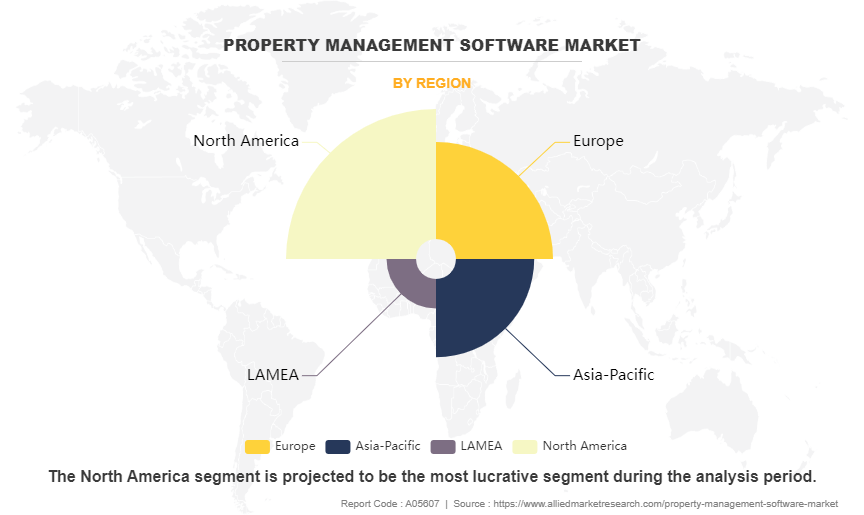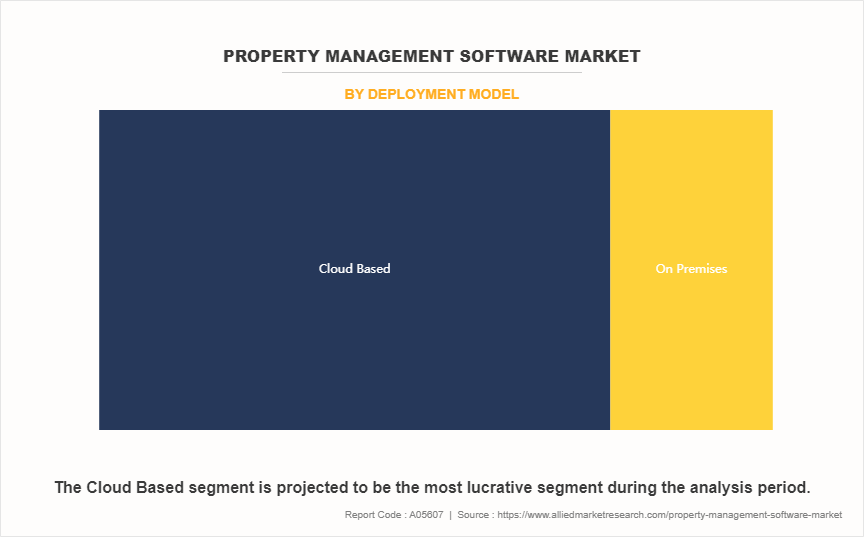Property Management Software Market Insights, 2033
The global property management software market size was valued at USD 3.2 billion in 2023, and is projected to reach USD 7.8 billion by 2033, growing at a CAGR of 8.9% from 2024 to 2033.
The adoption of artificial intelligence (AI) and machine learning, which enhance predictive maintenance, automate tenant screening, and improve customer service through chatbots is a major trend in the property management software market. Cloud-based property management solutions are also on the rise, offering greater flexibility, scalability, and remote access, which is especially important for property managers overseeing multiple properties in different locations.

Market Definition:
Property management software is a comprehensive tool that aids property managers, landlords, and real estate professionals in efficiently managing rental properties. It offers a wide range of functionalities, such as tenant management, which includes features for tenant screening, background checks, and credit reports. Lease tracking capabilities allow users to monitor lease agreements, renewal dates, and rent increases automatically. The software also typically includes financial management tools for handling rent collection, accounting, and financial reporting. Additionally, maintenance management features help track and manage repair requests and schedule regular property maintenance. Communication tools facilitate streamlined interaction with tenants, and reporting and analytics features provide insights into property performance and financial health.
Key Takeaways:
- By solution, the marketing and advertising segment held the largest share in the property management software market share in 2023.
- By deployment model, the cloud held the largest share in the market for 2023.
- By property type, the residential segment is expected to show the fastest property management software market growth during the forecast period.
- Region-wise, North America held the largest property management software market share in 2023. However, Asia-Pacific is expected to witness the highest CAGR during the forecast period.
In addition, the property management software market is expected to witness notable growth owing to adoption of cloud computing solutions and software-as-a-service (SaaS) platform, increase in development of smart real estate infrastructure and growth in dependency on one platform approach. Moreover, a rise in consumer demand for sustainable living and working space is expected to provide lucrative opportunity for the growth of the market during the forecast period. On the contrary, lack of awareness regarding optimal software solutions limits the growth of the market.
Segment Review
The property management software market is segmented into solution, deployment model, property type, and region. By solution, the market is divided into rental and tenant management, property sale and purchase solution, accounting and cash flow management software, marketing and advertising, legal and insurance consultancy, and others. By deployment model, it is divided into on-premise and Cloud-based property management software. By property type, it is segmented into residential, commercial, industrial and special purpose. Region wise, the property management software market trends are analyzed across North America (U.S. and Canada), Europe (UK, Germany, France, Italy, Spain, and rest of Europe), Asia-Pacific (China, Japan, India, Australia, South Korea, and rest of Asia-Pacific), and LAMEA (Latin America, the Middle East, and Africa).

On the basis of property type, the commercial dominated the property management software market size in 2022, owing to the rise in demand for integrated solutions that cater to the unique needs of commercial property managers and tenants. This includes features such as lease management tools, tenant tracking functionalities, and financial reporting capabilities tailored specifically for commercial properties. However, residential are expected to witness the fastest growth, owing to the increasing demand for tenant-centric features and functionalities that enhance the residential tenant experience. This includes self-service portals for online rent payments, maintenance requests, and lease renewals, as well as communication tools such as messaging and notifications to facilitate seamless interactions between property managers and tenants.

Region-wise, the property management software market size was dominated by North America in 2023 and is projected to maintain its leading position throughout the forecast period. This dominance is attributed to the increasing adoption of cloud-based solutions, driven by the demand for flexibility, scalability, and remote accessibility. Property managers are leveraging cloud-based platforms to streamline operations, enhance collaboration, and improve tenant satisfaction, particularly in the wake of the COVID-19 pandemic, which accelerated the shift towards remote work and digitalization.
Moreover, the integration of advanced technologies such as artificial intelligence (AI) and machine learning (ML) into property management software, enabling predictive analytics, automated workflows, and personalized tenant experiences. These AI-powered features empower property managers to make data-driven decisions, optimize processes, and deliver enhanced services to tenants, ultimately driving operational efficiency and revenue growth. On the other hand, the Asia-Pacific region is anticipated to experience significant growth in the property management software market during the forecast period, owing to increased digital penetration and rapid urbanization in this region has led to rise adoption of SaaS platforms across various industries such as educational facilities, industrial units, retail supermarkets and IT hubs. Additionally, there is a growing emphasis on localization and customization in property management software for the Asia-Pacific market, with providers offering features and functionalities tailored to the specific requirements and preferences of local property managers and landlords.
Top Impacting Factors
Adoption of cloud computing solutions and software-as-a-service (SaaS) platform
The adoption of cloud computing solutions and Software-as-a-Service (SaaS) platforms is a significant driver in the evolution of property management software. Cloud-based solutions offer unparalleled flexibility, allowing property managers to access and manage their operations from anywhere with an internet connection. This remote accessibility is particularly valuable for managing multiple properties across different locations. SaaS platforms eliminate the need for costly on-premises infrastructure and reduce the burden of software maintenance and updates, which are managed by the service provider.
This not only lowers upfront costs but also ensures that users always have access to the latest features and security enhancements. Furthermore, cloud computing facilitates real-time data synchronization and collaboration, enabling seamless communication between property managers, tenants, and service providers. The scalability of SaaS solutions means that they can grow with a business, accommodating an increasing number of properties and users without the need for significant additional investment. Additionally, the integration capabilities of cloud-based platforms allow easy connectivity with other essential software systems, such as accounting and customer relationship management (CRM) tools, creating a more efficient and cohesive management ecosystem.

Increase in development of smart real estate infrastructure
Development of smart building optimizes performance with wireless connectivity, sharing information systems and creating a cloud real-time communication network. With the adoption of property management software are able to construct smart sensing, and monitoring systems that eliminate human risks and errors to handle situations. With the help of connected property management solution property managers can build minimal cost wireless connected zones and enhance customer satisfaction.
Therefore, as various countries such as the U.S., UK, Japan, Germany, China, and India are focusing on developing smart cities, there has been observed, surge in investment in green and smart building has been driving the demand. For instance, in India, the government of Gujarat has been focusing to develop Smart City Ahmedabad Development Limited (SCADL). With the implementation of smart solution in housing society development such as sensing software, property management software (PMS) and asset tracking and managing solution, the local Ministry of Housing and Urban Affairs has been exploring smart infrastructural development. Therefore, aforementioned factors propel growth of the property management software market.
Competitive Analysis
Competitive analysis and profiles of the major key players in the property management software industry include IQware Inc., Microsoft Corporation, Oracle Corporation, PropertyMe Pty. Ltd., REI Master Pty. Ltd., AppFolio, Inc., Yardi Systems, Inc., Entrata, Inc., Alibaba Group Holding, and Console Australia Pty. Ltd. Major players have adopted product launch, partnership, collaborations, and acquisition as key developmental strategies to improve the product portfolio and gain strong foothold in the property management software industry.
On June 2022, Reapit, backed by Accel-KKR, acquired Console Group Pty Ltd., a leading provider of Property Management and Trust Accounting Software in Australia and New Zealand. The acquisition broadens Reapit's portfolio, including Agentbox and Agentpoint, and enables the company to offer a market-first end-to-end real estate solution for the ANZ region.
On March 2022, Reapit, backed by Accel-KKR, agreed to acquire Console Group Pty Limited, a leading provider of Property Management and Trust Accounting software in Australia and New Zealand. Console's flagship product, Console Cloud, has over 2,000 businesses. Reapit's acquisition deepens its commitment to delivering innovative solutions, extending AgentBox's CRM and AgentPoint's Digital Marketing solutions with Console Cloud's Property Management software.
Key Benefits For Stakeholders
- This report provides a quantitative analysis of the market segments, current real estate management software trends, estimations, and dynamics of the property management software market analysis from 2023 to 2033 to identify the prevailing property management software market forecast.
- The market research is offered along with information related to key drivers, restraints, and opportunities.
- Porter's five forces analysis highlights the potency of buyers and suppliers to enable stakeholders make profit-oriented business decisions and strengthen their supplier-buyer network.
- In-depth analysis of the market report segmentation assists to determine the prevailing property management software market opportunities.
- Major countries in each region are mapped according to their revenue contribution to the global property management software market.
- Property management software market player positioning facilitates benchmarking and provides a clear understanding of the present position of the market players.
- The report includes the analysis of the regional as well as global property management software market trends, key players, market segments, application areas, and global property management software growth strategies.
Property Management Software Market Report Highlights
| Aspects | Details |
| Market Size By 2033 | USD 7.8 billion |
| Growth Rate | CAGR of 8.9% |
| Forecast period | 2023 - 2033 |
| Report Pages | 279 |
| By Solution |
|
| By Deployment Model |
|
| By Property Type |
|
| By Region |
|
| Key Market Players | AppFolio, Inc., MRI Software LLC, Microsoft Corporation, Entrata, Inc., Yardi Systems, Inc., REI Master Pty. Ltd., IQware Inc., Oracle Corporation, PropertyMe Pty. Ltd., Console Australia Pty. Ltd. |
Analyst Review
To efficiently satisfy the requirements of the real estate managers, property management software has evolved through decades. To obtain a large market share, developers of property management software are increasingly implementing artificial intelligence (AI), big data analytics and cloud computing solutions. Business intelligence assists a wide range of operations, from automating renter contact and lead creation to screening of pre-qualified and interested prospective customers.
Property management software providers, who have access to extensive technical and financial resources, are anticipated to gain a competitive edge over their rivals, as they have the capacity to cater to the market requirements. The competitive environment in this market is expected to further intensify with an increase in technological innovations, product extensions, and different strategies adopted by key vendors. Rise in demand for smart networking systems is anticipated to propel the property management software market share during the forecast period. The industry has expanded as a result of the increase in development of smart real estate infrastructure, as well as adoption cloud computing solutions and software-as-a-service (SaaS) platform. On the other hand, increased reliance on one platform approach and consumer demand for sustainable living and working spaces is anticipated to increase market penetration, which is projected to fuel the expansion of the property management software market during the forecast period.
The global property management software market size was valued at USD 3.2 billion in 2023, and is projected to reach USD 7.8 billion by 2033
The global property management software market is projected to grow at a compound annual growth rate of 8.9% from 2024-2033 to reach USD 7.8 billion by 2033
The key players that operate in the property management software market are IQware Inc., Microsoft Corporation, Oracle Corporation, PropertyMe Pty. Ltd., REI Master Pty. Ltd., AppFolio, Inc., Yardi Systems, Inc., Entrata, Inc., Alibaba Group Holding, and Console Australia Pty. Ltd.
North America dominated in 2023 and is projected to maintain its leading position throughout the forecast period.
Adoption of cloud computing solutions & software-as-a-service (SaaS) platform and Increase in development of smart real estate infrastructure
Loading Table Of Content...
Loading Research Methodology...


